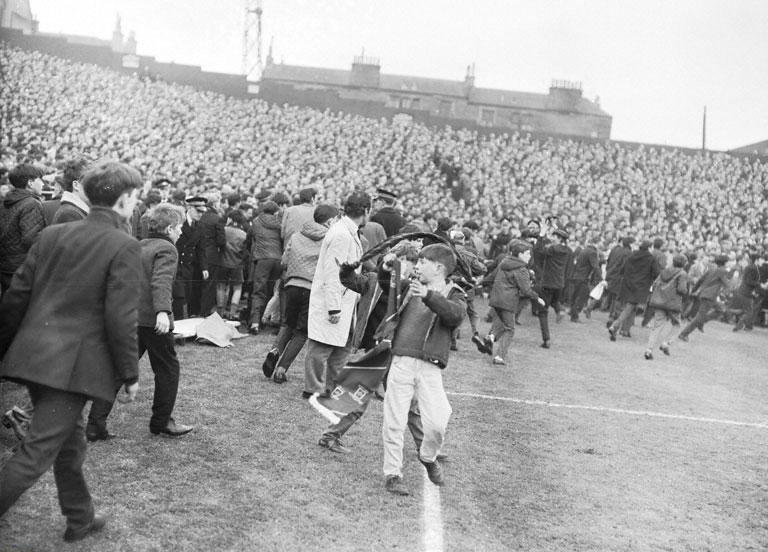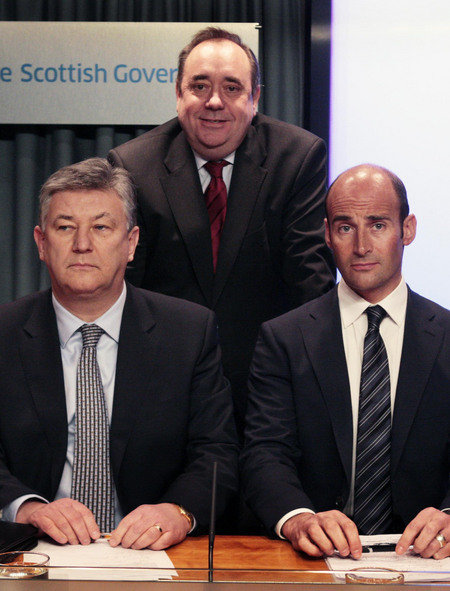In terms of this season, Brown has matured in some ways, provided leadership at certain key points and also demonstrated a bite and drive that the team evidently miss in his absence. Scott Brown missed all of October and most of November through injury which may, or may not, have coincided with the team’s’ worst vein of form. By the time he returned, his impact on the side was heralded by many particularly by the manager. For example, the Daily Telegraph reported just before Celtic’s last europa League group game against Udinese that Brown was being put back in the side even after a lengthy period on the sidelines:
“The Celtic captain was the victim of a persistent ankle injury that ruled him out for two months and has restricted him to three substitute appearances since his recent recovery. However, he is seen by Lennon as a player whose purpose and strength in midfield would be an asset on a Europa League evening when, yet again, the manager must do without key players, notably in defence. [Neil Lennon said] “It’s been a bit stop-start for him of late. He had a real bad hamstring injury last season and it’s not recovering the way we would like it to. So he may need a rest…Scott will definitely be in contention. We need a bit of running power in there because they are very strong in midfield. Scott will certainly provide that for us.” [i] In the game itself, Celtic were quite unlucky only to draw and secure passage to the knock out stages of the tournament.
Brown himself seemed to hit the ground running when he returned and by the end of January, Scott Brown had actually been rewarded with the Clydesdale Bank player of the month award for January:
Celtic manager Neil Lennon says the Clydesdale Bank player of the month for January, Scott Brown, has more to offer than he did during his time as captain. Brown, who has scored in each of his last three matches, returned to form after a spell out injured and Lennon believes has matured in the role. “He’s got more attributes than I had in terms of his running power and his eye for a goal,” said Lennon. “I’m very pleased with the way he has progressed.”[ii] Celtic, by this stage, were top of the League by some margin (after having overcome a significant points difference) and were actually pushing for a domestic treble.
There have ofcourse been bad points (at least in my opinion). The 2-3 reverse at Ibrox in March saw Brown essentially go missing for large chunks of the game and his temper was proving barely controllable. While the reduction of the team to nine men against Rangers would have agitated even the most docile Celtic-minded person, Brown should have displayed more composure and leadership and indeed only seemed to grasp this towards the end of the match when he coolly dispatched a late penalty for Celtic. Nevertheless, these negative occasions are now a blip rather than the usual fare with Scott. The last three seasons have seen Scott’s disciplinary record improve significantly. Season 2009/10 Scott picked up 7 bookings and 1 red, 2010/11 12 bookings and 1 red while 2011/12 saw just 6 bookings (1 of those for Scotland) and no red cards.
In terms of expendability, Brown has also continued to be seen as a player that would (could?) be sacrificed at the altar of ‘asset management’. This notion became visited quite a bit in late 2011 when Brown was involved in contract negotiations. Andy Muirhead, for example, typified a not-so-insignificant strain of opinion within the support when he stated on his ESPN Soccernet blog: “with Scott Brown in the process of re-negotiating a new deal, stalling only due to his agent’s demands, maybe its time the club took a step back and decided to cash in on the 26 year old…If I was in charge of the wheeling and dealing at Celtic, I would cash in on Brown now. Offer Brown in the January transfer window for a knock down price to move him on and free up his wages.[iii]
However, his own determination to stay was not be underestimated and in December 2011, Scott Brown “finally pledged his future to Celtic by signing a new long-term contract. The Celtic skipper will give the best years of his career to the club after penning a four-year deal with a one-year extension.”[iv] This contract extension also coincided with his best goal-scoring form since arriving at the club. Between late January and the end of March 2012, Scott Brown scored 6 goals and recorded 3 assists (of his goals scored: 3 league goals scored, 2 Scottish Cup goals scored and 1 League Cup goal scored) with 4 of his goals coming from the penalty spot as he became the team’s new designated penalty taker. This total was 2 better than 2010/11 and 4 better than 2009/10 and it is not inconceivable that Brown has been instructed to get himself on the score-sheet more often a la John Collins transformation into a goal-scoring midfielder in the early 1990’s.
The biggest change that has been evident about Brown this season is his relish with regards to being a Celtic player and it appears that he is beginning to understand the demands and concerns of the supporters. For example, the Daily Record in April reported that Brown was adament that Celtic would have to win against Rangers to equalise the series of Glasgow derbies in the 2011/12 season:
“Asked if it would mean anything to get it back to 2-2, Brown said: “Yes, especially being at home as well. It has been a long time since we have gone into an Old Firm game as champions…We were favourites in the last match at Ibrox – and that’s the first time that has happened in many years. What happened that day happened, but we can now bring them back to our place and we definitely want revenge.”[v]
This awareness continued to be displayed when the Daily Telegraph reported at the end of April about the poor start the team made to the campaign:
“We didn’t start as well as we could have but as the season has gone on we have got stronger and stronger. We have understood everyone’s game and the gaffer has more of a settled team – it’s looking good for us, that’s for sure“.[vi]
To conclude, this has been successful season for Scott Brown. He is now the Captain of a Championship winning team, his presence in the team is being complemented by team’s’ tactical approach (rather than hindering it), and he has improved positive aspects to his game as well as redressing negative ones. He hasn’t needed to goad El Hadj Diouff into making supporters believe he cares and his absence in the team is now keenly felt as opposed to being positively welcomed. In short, Scott has grown up and I, like many other supporters, am looking forward to further flourishing of this important player.





